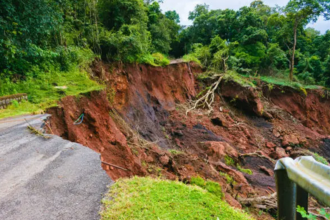On January 1, the flow of Russian gas through Ukraine was abruptly halted, a move that has sent shockwaves through the region. Kyiv’s decision not to extend the gas transit agreement with Russia’s Gazprom led to what officials in Ukraine call a “historic” moment. The cessation of gas supplies is a blow to Russia’s finances. It signals a broader geopolitical struggle impacting Moldova, particularly the breakaway region of Transnistria, which heavily relies on Russian energy. This energy crisis has led to a significant Moldova gas shortage, compounding the already unstable situation.
- How Will Moldova Cope with the Energy Crisis?
- Can Coal Replace Russian Gas in Transnistria?
- Is Moldova Facing an Economic and Political Crisis?
- How Is Moldova's Relationship with Russia Impacting the Crisis?
- Could the Energy Crisis Propel Pro-Russian Forces to Power?
- Is Russia Trying to Destabilize Moldova?
How Will Moldova Cope with the Energy Crisis?
The halting of gas supplies through Ukraine poses a grave threat to Moldova, a country already grappling with economic instability. In Transnistria, a separatist region of eastern Moldova loyal to Moscow, the effects of the cut-off were felt immediately. As the new year began, the region faced severe energy shortages, with only hospitals and critical infrastructure receiving heating while homes were left cold.
“We still have gas, but the pressure is very low—just what’s left in the pipes,” Dmitry, a resident of Transnistria, said. “The hot water was on until about 2 a.m., I checked. Now it’s off, and the radiators are barely warm.”
This sudden energy crisis, causing significant disruption in Moldova, is compounded by Transnistria’s long dependence on Russian gas, which has been supplied at no cost. “They just have a file where it says how much the debt is each month,” explained an analyst from the Polish Institute of International Affairs. “But Russia is not interested in asking for this money.”
With the lifeline through Ukraine now severed, residents of Transnistria are bracing for harsher conditions. Local authorities have set up “heating points” and even launched hotlines for people to find firewood. Families have been advised to gather in one room for warmth and seal their homes’ cracks with blankets.
“It’s chilly now inside the flat,” Dmitry added, referring to the growing cold in his home. “And we don’t know what frost January will bring.”
Can Coal Replace Russian Gas in Transnistria?
Although Transnistria still has access to electricity, the situation is dire. The main power plant in Kurchugan, which supplies much of the region with electricity, has been switched to coal, as Russian gas is no longer available. However, the authorities have warned that there is only enough coal to last for 50 days. After that, the power supply could be severely disrupted in Transnistria and the rest of Moldova, which relies on Kurchugan for 80% of its electricity.
The Moldovan government has assured its citizens that there is enough gas to heat the country until spring. However, they are also preparing to buy electricity from Europe, leading to a sharp increase in energy costs. A state of emergency was declared last month, and both businesses and citizens have been urged to reduce their energy consumption in preparation for possible power cuts.
Is Moldova Facing an Economic and Political Crisis?
While Moldova’s energy crisis is precarious, the country faces a larger political crisis. The government in Chisinau is already contending with the mounting pressure of rising electricity prices and the threat of social unrest. The situation is particularly dire in Transnistria, where the local economy, heavily dependent on Russian subsidies, is teetering on the edge of collapse.
“The prices here would shoot up, including for heating and food. But pensions here are tiny, and there’s no work,” Dmitry said, speaking from the buffer zone on the edge of Transnistria. “People are barely clinging on as it is.”
Many see this energy crisis as a geopolitical move by Russia aimed at destabilizing Moldova and causing division within the country. “We’re treating this not as an energy crisis but a security crisis, induced by Russia to destabilize Moldova both economically and socially,” Olga Rosca, foreign policy adviser to Moldova’s president, explained.
How Is Moldova's Relationship with Russia Impacting the Crisis?
Relations between Moldova and Russia have been strained for years, particularly since Moldova has moved closer to the European Union. In recent years, Moldova has strengthened its ties with the EU despite pressure from Moscow. In the aftermath of Russia’s full-scale invasion of Ukraine, Moldova has taken further steps to distance itself from Russian influence, including opening talks for potential EU membership.
President Maia Sandu was re-elected last year despite a massive anti-campaign orchestrated by Moscow. However, the Kremlin’s attempts to destabilize Moldova have not stopped. Just before Sandu’s inauguration, Russia’s external SVR intelligence agency released a false statement claiming she was planning to take Transnistria back by force to restore energy supplies. The statement sought to portray Sandu as “frenzied” and “emotionally unstable.”
Could the Energy Crisis Propel Pro-Russian Forces to Power?
Despite Moldova’s challenges, Russia’s long-term strategy could create a situation where pro-Russian political forces gain influence. According to an analyst, Moscow is using the energy crisis to fuel political instability. “It’s a reason to make some political and social issues in Moldova,” the analyst said. “Electricity prices have already risen about six times in three years, and people are angry.”
As the humanitarian situation in Transnistria worsens and the pressure on Chisinau intensifies, Moldova may find itself in a precarious position as it heads toward parliamentary elections in 2025. The rising cost of living and the ongoing Moldova gas shortage could lead many Moldovans to shift their political allegiance, paving the way for pro-Russian parties to gain a foothold in the country.
“Russia can wait for the elections, and then parties who are not pro-EU will probably win,” the analyst predicted. “Because Maia Sandu can talk about EU accession, but what use is that if people don’t have money for electricity or gas?”
Is Russia Trying to Destabilize Moldova?
In Transnistria, the worsening conditions have already sparked fears of further instability. “They will create a narrative of Chisinau freezing Transnistria into submission,” Olga Rosca believes, referring to Russia’s potential narrative of Moldovan authorities deliberately neglecting Transnistria. The region’s isolation seems to deepen, with Transnistria refusing outside help, including generators.
As Moldova faces an uncertain future, the energy crisis is just one part of Russia’s larger geopolitical game. Moscow aimed to weaken Moldova economically, socially, and politically to bring the country back into its influence.
“The aim for Russia is to create enough instability to shift Moldova’s political alignment,” the analyst said. “If Moldova’s economy collapses under the strain of rising costs, people might turn back to pro-Russian parties for relief.”








